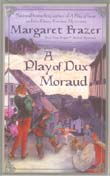September 22nd, 2010
A MEDIEVAL YEAR IN ENGLAND:
SEPTEMBER The corn (think
various grains, not American maize on its cobs) harvest that began in
August goes on. As the fieldwork and drying finish, the crop is loaded
into carts or baskets well-lined enough to allow the loss of very
little of the grain on the rough tracks from fields to home and
storage. This is Harvest Home, and the last load reaching the barn
signals the time for the great harvest feast at the lord of the manor’s
expense if this has been his bidreap, or by the corn’s owner for the
workers he has hired. Much of the corn is stored still
in-the-ear, to be threshed in the coming wet weather, on threshing
floors in large barns. A barn dance on the threshing floor at harvest’s
end serves no only for celebration but to smooth and flatten the earth
for the threshing to come. The barns are built for good lighting and to
catch the wind because winnowing will follow threshing, and the wind
serves to carry away the chaff while the seeds, being heavier, mostly
fall near the winnower and are carefully sorted through by hand for
seed corn to be saved for planting next year. With the harvest
done and stored, the gleaners are allowed into the fields. A family
working hard can gather enough left-grain for porridge or bread. Then
the Michaelmas geese and other poultry are turned into the stubble to
eat any remaining fallen grain. The stover – the standing straw left
from harvest – is cut and stored for winter fodder as quickly as may
be, lest rain or cattle get to it first. Any green growth among the
stubble is afterward grazed off, first by cows, then more closely by
sheep, that nothing goes to waste. The straw not used for fodder is
used as thatch (though it is not the best material for that), and for
straw ropes to be wound into household furnishings such as rugs and
hassocks, bed-mats to be used alone or under feather beds for extra
warmth, and such things as baskets, hampers, beehives, and
bottle-covers. There are other harvests, too. September blow soft
Until fruit be in loft is
an old saying, expressing hope there be no storms until the orchards
have been cleared. Beehives that were properly cared for in the summer
should now give up their honey and wax, to be used for sweetening in
cooking, curing hams, preserving fruit, making of candles, and for sale
at the autumn Honey Fairs. The series of autumn fairs that began
in August continue, with livestock fairs common as people decide what
stock they will be able to keep over the winter, depending on whether
haying and harvest have been good or ill. What cannot be sold or kept
fed through the coming months will have to be slaughtered and the meat
preserved. Or if the year has been good, now is the chance to increase
the herd. For shepherds this is tupping time – breeding ewes for next year’s crop. In
the fields, as soon as the last gleaning and grazing are done, plowing
starts again, to ready the fields for planting of winter wheat and rye
before the autumn rains begin. September 8th commemorates the Nativity of the Virgin Mary, with a week of various observances before it. September
14th is Holyrood Day, celebrating the Exaltation of the Holy Cross and
a holiday from school and work if possible. Custom holds this to be the
day to go nutting, harvesting nuts for the coming year. The following
Wednesday, Friday, and Saturday are Ember Days, for fasting or
abstinence. The hunters’ time of grace from June comes to an end
today. For two more weeks the roebuck is in season and it is said that
“If the buck rises with a dry horn on Holyrood morn, it is the sign of
a Michaelmas summer,” meaning fair weather before the equinoctial
storms. September 29th is Michaelmas – the feast of St. Michael
the Archangel (with “and All Angels” a later addition). This is a
Quarter Day, when rents come due, the year’s accounts are rendered to
your lord, and new leases and servants’ hiring contracts begun.
Agreements on land are made or ended or renewed. In towns this is often
the election day for officers. In London and Middlesex the sheriffs
elected last June are sworn into office for the coming year. For
hunters from now until June is closed season on harts and bucks, but
open season begins on hares, and on hinds and roes until Candlemas in
February. Bird-netting also begins, and the geese so gladly fattened on the harvested fields are supposed to be eaten now because Who eats goose on Michaelmas Day
Shall never lack money his debts to pay. But do not eat blackberries again this year because the Devil is supposed to wave his club over the bushes today and curse them. 
- Margaret |